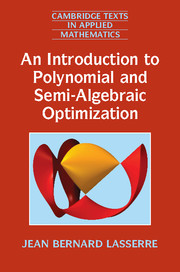Book contents
- Frontmatter
- Dedication
- Contents
- Preface
- List of symbols
- 1 Introduction and message of the book
- PART I POSITIVE POLYNOMIALS AND MOMENT PROBLEMS
- PART II POLYNOMIAL AND SEMI-ALGEBRAIC OPTIMIZATION
- 5 The primal and dual points of view
- 6 Semidefinite relaxations for polynomial optimization
- 7 Global optimality certificates
- 8 Exploiting sparsity or symmetry
- 9 LP-relaxations for polynomial optimization
- 10 Minimization of rational functions
- 11 Semidefinite relaxations for semi-algebraic optimization
- 12 Polynomial optimization as an eigenvalue problem
- PART III Specializations and extensions
- Appendix A Semidefinite programming
- Appendix B The GloptiPoly software
- References
- Index
11 - Semidefinite relaxations for semi-algebraic optimization
Published online by Cambridge University Press: 05 February 2015
- Frontmatter
- Dedication
- Contents
- Preface
- List of symbols
- 1 Introduction and message of the book
- PART I POSITIVE POLYNOMIALS AND MOMENT PROBLEMS
- PART II POLYNOMIAL AND SEMI-ALGEBRAIC OPTIMIZATION
- 5 The primal and dual points of view
- 6 Semidefinite relaxations for polynomial optimization
- 7 Global optimality certificates
- 8 Exploiting sparsity or symmetry
- 9 LP-relaxations for polynomial optimization
- 10 Minimization of rational functions
- 11 Semidefinite relaxations for semi-algebraic optimization
- 12 Polynomial optimization as an eigenvalue problem
- PART III Specializations and extensions
- Appendix A Semidefinite programming
- Appendix B The GloptiPoly software
- References
- Index
Summary
Introduction
The power of the moment-SOS approach for polynomial optimization rests upon the fact that the powerful Putinar positivity certificate (2.10)
• is stated in terms of SOS polynomial weights, and
• is linear in the polynomials that describe the feasible set K,
which allows a practical and efficient computational procedure to be defined, as described in Chapter 6. For instance, the stronger and more general Stengle positivity certificates of Theorem 2.12 do not have this property.
From an optimization (and practical) viewpoint there should be a trade off between the generality (or strength) of a positivity certificate and whether it can be implemented in some practical efficient numerical procedure. In this respect Putinar's Positivstellensatz in Theorem 2.15 achieves a good compromise since by being restricted to compact basic semi-algebraic sets K and polynomial objective functions, it still applies to a large class of important optimization problems while being implementable in an efficient practical procedure.
However, even though such polynomial optimization problems encompass many important applications of practical interest, one may wonder whether the moment-SOS approach described in Chapter 6 can be extended to a more general class of optimization problems that involve some algebra of functions larger than the polynomials.
In Chapter 10 we have already seen how to minimize a sum of rational functions on a compact basic semi-algebraic set. However, in several applications one has to deal with functions like absolute values, square roots, fractions with rational powers, etc., which appear in both the objective function to be minimized an the description of the feasible set K. Again, to extend the moment-SOS approach to this new framework one needs an analogue of Putinar's positivity certificate for such functions which also translates into a practical procedure for optimization purposes.
In this chapter we consider the algebra A which consists of functions on a basic semi-algebraic set K ⊂ ℝn, generated by basic monadic and dyadic relations on polynomials.
- Type
- Chapter
- Information
- An Introduction to Polynomial and Semi-Algebraic Optimization , pp. 164 - 173Publisher: Cambridge University PressPrint publication year: 2015

